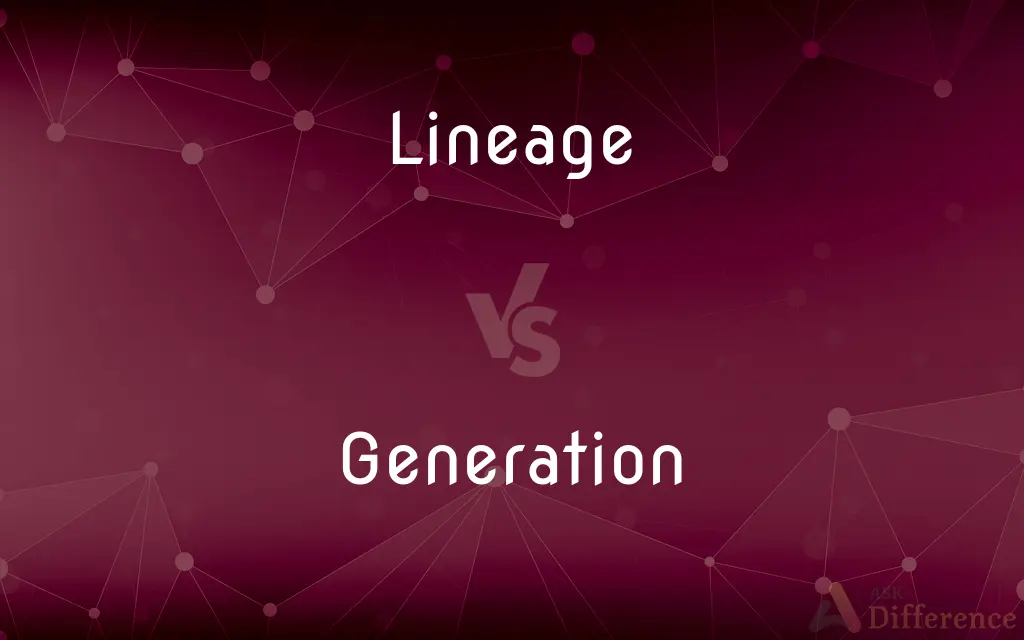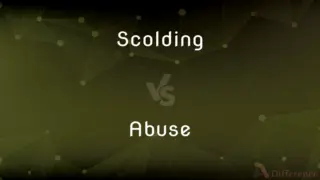Lineage vs. Generation — What's the Difference?
Edited by Tayyaba Rehman — By Fiza Rafique — Updated on April 8, 2024
Lineage refers to the direct descent from an ancestor, highlighting family heritage and blood relations, while generation signifies all individuals born and living at about the same time, sharing similar cultural experiences.

Difference Between Lineage and Generation
Table of Contents
ADVERTISEMENT
Key Differences
Lineage emphasizes the vertical relationship within a family, tracing the descent from ancestors to current members. It’s concerned with heritage, focusing on the transmission of family traits, property, or titles through generations. Generation, on the other hand, looks horizontally at a group of individuals, often within a broader societal context, who are of a similar age and experience societal events together, shaping a collective identity.
While lineage is specific to family history and connections, highlighting the continuity and legacy of a family, generations are defined by their shared experiences, such as technological advancements, historical events, or cultural shifts. This distinction underscores the difference between personal family heritage and broader societal or cultural cohorts.
The concept of lineage is deeply rooted in genealogy, where individuals trace their family’s roots and connections, often to understand their place within a family’s history. Generations, however, are studied in sociology and anthropology to examine the effects of social change over time, considering how each generation differs from the previous in terms of values, behaviors, and attitudes.
Lineage involves a detailed understanding of one's ancestors and their relationships, often documented through family trees or historical records. In contrast, generations are categorized more broadly, typically into groups with names (e.g., Baby Boomers, Millennials) that reflect their common characteristics or defining moments.
Culturally, lineage can influence one's identity and status, particularly in societies where family heritage holds significant importance. Generations, while also contributing to identity, often do so in the context of shared societal or cultural milestones, influencing group norms and collective memory.
ADVERTISEMENT
Comparison Chart
Definition
Direct descent from an ancestor
A cohort of individuals born and living around the same time
Perspective
Vertical within a family
Horizontal across a societal group
Importance
Individual family history
Collective societal identity
Study Area
Genealogy
Sociology and anthropology
Documentation
Family trees, historical records
Generational names, sociocultural studies
Cultural Significance
Identity, status based on ancestry
Shared norms, attitudes, and behaviors
Examples
Tracing one's ancestors back several generations
Baby Boomers, Gen X, Millennials, Gen Z
Compare with Definitions
Lineage
A sequence of direct ancestors and descendants in a family.
Her lineage can be traced back to the Mayflower passengers.
Generation
A group of individuals born around the same period, sharing common societal experiences.
Millennials are known for their comfort with technology.
Lineage
Reflects a vertical relationship within families.
His lineage includes several war heroes.
Generation
Studies focus on shifts in values and behaviors.
Each generation seems to redefine work-life balance.
Lineage
Focuses on blood relations and heritage.
The royal family's lineage is well-documented.
Generation
Categorized by specific names reflecting their era.
Baby Boomers were born post-World War II.
Lineage
Important in societies valuing ancestry.
In her culture, lineage influences social standing.
Generation
Defined by shared cultural or societal milestones.
Generation Z has been shaped by social media.
Lineage
Often associated with the transmission of titles or property.
The lineage determined the heir to the estate.
Generation
Reflects a broad, societal perspective.
Current generations are more environmentally conscious.
Lineage
Direct descent from a particular ancestor; ancestry.
Generation
A generation is "all of the people born and living at about the same time, regarded collectively." It can also be described as, "the average period, generally considered to be about 20–30 years, during which children are born and grow up, become adults, and begin to have children." In kinship terminology, it is a structural term designating the parent-child relationship. It is known as biogenesis, reproduction, or procreation in the biological sciences.
Lineage
Derivation.
Generation
All of the people born and living at about the same time, regarded collectively
One of his generation's finest songwriters
Lineage
The descendants of a common ancestor considered to be the founder of the line.
Generation
The production or creation of something
Methods of electricity generation
The generation of wealth
Lineage
Variant of linage.
Generation
The people born and living about the same time, considered as a group
The baby-boom generation.
Lineage
The number of lines of printed or written material.
Generation
The average interval of time between the birth of parents and the birth of their offspring
A social change that took place over three generations.
Lineage
Payment for written work at a specified amount per line.
Generation
All of the offspring that are at the same stage of descent from a common ancestor
Mother and daughters represent two generations.
Lineage
Descent in a line from a common progenitor; progeny; descending line of offspring or ascending line of parentage.
Generation
A stage or period of sequential technological development and innovation.
Lineage
(advertising) A number of lines of text in a column.
Generation
A class of objects derived from a preceding class
A new generation of computers.
Lineage
A fee or rate paid per line of text.
Generation
The formation of a line or geometric figure by the movement of a point or line.
Lineage
Descent in a line from a common progenitor; progeny; race; descending line of offspring or ascending line of parentage.
Both the lineage and the certain sireFrom which I sprung, from me are hidden yet.
Generation
The act or process of generating; origination, production, or procreation.
Lineage
The descendants of one individual;
His entire lineage has been warriors
Generation
(Physics) Any of three groups of fundamental fermions, each containing two quarks and two leptons, together with their associated antiparticles, corresponding members of which differ in mass and lifetime. The first or electron generation consists of the down quark, up quark, electron, and electron neutrino lepton. The second or muon generation consists of the strange quark, charm quark, muon, and muon neutrino lepton. The third or tauon generation consists of the bottom quark, top quark, muon, and muon neutrino lepton.
Lineage
The kinship relation between an individual and the individual's progenitors
Generation
The act of creating something or bringing something into being; production, creation.
Lineage
The number of lines in a piece of printed material
Generation
The act of creating a living creature or organism; procreation.
Lineage
A rate of payment for written material that is measured according to the number of lines submitted
Generation
Race, family; breed.
Generation
A single step or stage in the succession of natural descent; a rank or degree in genealogy, the members of a family from the same parents, considered as a single unit.
This is the book of the generations of Adam - Genesis 5:1
Ye shall remain there [in Babylon] many years, and for a long season, namely, seven generations - Baruch 6:3
All generations and ages of the Christian church - Richard Hooker
Generation
(obsolete) Descendants, progeny; offspring.
Generation
The average amount of time needed for children to grow up and have children of their own, generally considered to be a period of around thirty years, used as a measure of time.
Generation
A set stage in the development of computing or of a specific technology.
Generation
(geometry) The formation or production of any geometrical magnitude, as a line, a surface, a solid, by the motion, in accordance with a mathematical law, of a point or a magnitude, by the motion of a point, of a surface by a line, a sphere by a semicircle, etc.
The generation of a line or curve
Generation
A group of people born in a specific range of years and whose members can relate culturally to one another.
Generation X grew up in the eighties, whereas the generation known as the millennials grew up in the nineties.
Generation
A version of a form of pop culture which differs from later or earlier versions.
People sometimes dispute which generation of Star Trek is best, including the original and The Next Generation.
Generation
(television) A copy of a recording made from an earlier copy and thus further degraded in quality.
Generation
The act of generating or begetting; procreation, as of animals.
Generation
Origination by some process, mathematical, chemical, or vital; production; formation; as, the generation of sounds, of gases, of curves, etc.
Generation
That which is generated or brought forth; progeny; offspiring.
Generation
A single step or stage in the succession of natural descent; a rank or remove in genealogy. Hence: The body of those who are of the same genealogical rank or remove from an ancestor; the mass of beings living at one period; also, the average lifetime of man, or the ordinary period of time at which one rank follows another, or father is succeeded by child, usually assumed to be one third of a century; an age.
This is the book of the generations of Adam.
Ye shall remain there [in Babylon] many years, and for a long season, namely, seven generations.
All generations and ages of the Christian church.
Generation
Race; kind; family; breed; stock.
Thy mother's of my generation; what's she, if I be a dog?
Generation
The formation or production of any geometrical magnitude, as a line, a surface, a solid, by the motion, in accordance with a mathematical law, of a point or a magnitude; as, the generation of a line or curve by the motion of a point, of a surface by a line, a sphere by a semicircle, etc.
Generation
The aggregate of the functions and phenomene which attend reproduction.
Generation
All the people living at the same time or of approximately the same age
Generation
Group of genetically related organisms constituting a single step in the line of descent
Generation
The normal time between successive generations;
They had to wait a generation for that prejudice to fade
Generation
A stage of technological development or innovation;
The third generation of computers
Generation
A coming into being
Generation
The production of heat or electricity;
Dams were built for the generation of electricity
Generation
The act of producing offspring or multiplying by such production
Common Curiosities
How are generations named or categorized?
Generations are named or categorized based on significant societal, economic, or technological changes during their formative years, often by sociologists or cultural commentators.
What factors contribute to the formation of a generational identity?
Factors include historical events, technological advancements, economic conditions, and prevailing societal attitudes during a group’s coming-of-age years.
Can the concept of lineage apply to things other than families?
Yes, lineage can also refer to the development or history of non-familial entities, such as artistic movements, ideas, or breeds of animals and plants.
What determines a person's lineage?
A person's lineage is determined by their direct family ancestors and descendants, often documented through genealogical research.
What is the significance of understanding one's lineage?
Understanding one's lineage can provide insights into family history, cultural heritage, and inherited traits or conditions.
How do generations impact society?
Generations impact society by influencing cultural trends, societal values, and economic conditions through their collective actions and preferences.
Does everyone in a generation share the same characteristics?
While generations share common experiences, individual variation exists due to personal, cultural, and socio-economic factors.
Can an individual belong to multiple lineages?
Yes, an individual can belong to multiple lineages through different branches of their family tree, tracing maternal and paternal lines.
Is lineage only important in certain cultures?
While the importance of lineage varies, many cultures value understanding one's ancestry for reasons ranging from maintaining family history to determining inheritance.
Why do generations sometimes conflict with each other?
Generational conflicts often arise from differing values, experiences, and societal conditions that shape each generation’s perspectives and behaviors.
How long is a generation in years?
While there’s no fixed duration, a generation is typically considered to be about 20 to 30 years, marking the average period between the birth of parents and their offspring.
Can the study of generations predict future societal trends?
Studying generational characteristics and values can provide insights into potential future societal trends, but predictions remain speculative due to the complexity of societal dynamics.
How does one research their lineage?
Researching lineage involves examining historical records, family documents, and using genealogy databases or DNA testing to trace ancestral connections.
How do lineage and generation contribute to identity?
Lineage contributes to personal and familial identity through ancestral heritage, while generation shapes collective identity based on shared societal experiences.
Share Your Discovery

Previous Comparison
Scolding vs. Abuse
Next Comparison
Conscript vs. DraftAuthor Spotlight
Written by
Fiza RafiqueFiza Rafique is a skilled content writer at AskDifference.com, where she meticulously refines and enhances written pieces. Drawing from her vast editorial expertise, Fiza ensures clarity, accuracy, and precision in every article. Passionate about language, she continually seeks to elevate the quality of content for readers worldwide.
Edited by
Tayyaba RehmanTayyaba Rehman is a distinguished writer, currently serving as a primary contributor to askdifference.com. As a researcher in semantics and etymology, Tayyaba's passion for the complexity of languages and their distinctions has found a perfect home on the platform. Tayyaba delves into the intricacies of language, distinguishing between commonly confused words and phrases, thereby providing clarity for readers worldwide.














































